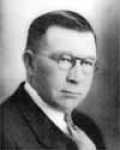The Grandpa I never knew

This week I read the accounts of my grandfather's death on the No. 6 passenger train on the morning of June 28, 1942. David E. Booth was a Burlington Route conductor and his run was between McCook and Hastings. Near Heartwell, he suffered a heart attack in the washroom, fell against the door and died. From all that I know of him, he was a very nice man.
My brother, Brad, was a baby and was the closest of the three grandsons when Grandpa died. He was not quite five months old but the night of June 27, as Grandpa Booth was leaving his house at 606 West 4th for work, he stopped on the front porch where my mom was sitting on the glider with Brad.
Grandpa was eager for Brad to do everything but that night he seemed especially eager for him to stand up. Just like he didn't have time to wait ... he wanted to see him do everything ... now. As it turned out, he didn't have much time.
My grandfather was born at Long Island, Kan., and started work for the Burlington at Orleans in 1906. In 1914, he moved to McCook and had lived here until his death at age 59. He and my grandmother, Nellie Ennis Booth, had three children ... my dad, Clarence (Buss-from Buster Brown); Mildred Leona (Ona) McCafferty and Clara Stella (Tootsie) Goodenberger. The funeral was at the Methodist Church with Pade and Herrmann Funeral home in charge of arrangements.
I was kind of disappointed when I read all that there was in the papers. I wanted to know more ... this was the grandfather I never got to meet. I'm not sure what I expected, thoughts from people on the street and his fellow railroaders, pictures, an essay written by him as to what his aspirations had been for his life ... I just wanted to know more.
McCook has always been a musical town and that fact was again evidenced in the July 6, 1942, McCook Daily Gazette. Velma Sutton, daughter of H.P. Sutton had always had the best of voice training. She had quite a career and notices of when Miss Velma would be appearing on the radio from New York City were quite familiar in the local paper. There was an ad in the paper which advertised that Velma Sutton (Mrs. George Kisevalter Jr.) was offering a six-week voice instruction summer course beginning July 6. That would have been quite an opportunity for McCookites with talent.
Two McCook sisters, Ardis and Avis Schmitz were commuting between Denver and McCook to appear in a Denver opera production of "The Merry Widow". Ardis was appearing as "Jou-Jou", one of the principals and both were included in a major dance number. The opera was presented in Denver's Cheesman park on July 14, 15, 16 and 17, 1942. A Denver Post of the time had shown a picture of Ardis saying, "Nearly all of the best singers in this part of the country tried out for roles in 'The Merry Widow' and from this large number Director John C. Kendel picked an outstanding cast." The McCook High School Band under the direction of Leo Kelly performed summer concerts at the City Park at 8:30 p.m. There were nine selections on the program including Col. Lindberg's march, "Lucky Slim," by Mader and the ever-popular "Who's Afraid of the Big, Bad Wolf" by Churchill. The Olympia was advertising your favorite beer and a delicious Braunschweiger sandwich for 25 cents or a mammoth golden cantaloupe sundae ... served in a half a cantaloupe for 15 cents.
Classes for certification as an Air Raid Warden were held with large numbers of men and women turning out. Instructors were F.N. Weiland, Harold Sutton, Tom Colfer and R. Harvey Porter. What we now we call "terrorism" was "sabotage" during World War II. Colfer's lecture concerned the mechanics of sabotage, dealing with explosives in some detail. Porter's presentation was devoted to first aid for gas victims. There were seven classes in the first stage of the Warden's course. The classes were conducted under the auspices of the American Legion in McCook.
Walter F. Roberts, state defense coordinator told managers of the Consumers Public Power District that Nebraska could become a "hot spot" for enemy aerial attacks because of the $200,000,000 in war plants located here. "Distances cease to be a protection with planes able to make non-stop flights of 7,000 miles."
Bicycles were being rationed and if you could get a purchase certificate from your local Rationing Board, Montgomery Ward wanted you to bring it to 317 Main Street to buy their "litewate" wartime bicycle in either a man's or woman's model. They were Hawthorne, weighed 35 1/2 pounds and sold for $30.95.
Hested's Music Department was buying old records for 5 cents a pound. They could be broken or cracked and they were going to recycle them into new records. There were brands that they would not accept though and those are the ones that I remember ... the Edison, Brunswick, Columbia and Velvetone.
